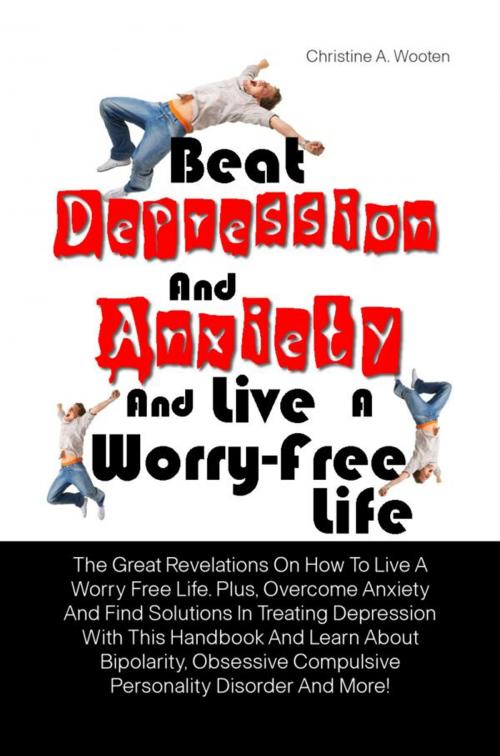Beat Depression And Anxiety And Live A Worry-Free Life
The Great Revelations On How To Live A Worry Free Life. Plus, Overcome Anxiety And Find Solutions In Treating Depression With This Handbook And Learn About Bipolarity, Obsessive Compulsive Personality Disorder And More!
Nonfiction, Health & Well Being, Self Help, Mental Health, Depression, Psychology, Emotions, Health, Healthy Living| Author: | Christine A. Wooten | ISBN: | 1230000019420 |
| Publisher: | KMS Publishing | Publication: | September 23, 2012 |
| Imprint: | Language: | English |
| Author: | Christine A. Wooten |
| ISBN: | 1230000019420 |
| Publisher: | KMS Publishing |
| Publication: | September 23, 2012 |
| Imprint: | |
| Language: | English |
Depression is a psychological, biological and environmental problem that has affected millions of people, both directly and indirectly. People suffering with depression often have difficulty functioning normally, and frequently experience problems in their everyday lives as a result. The emotional toll of depression can shatter families; result in a loss of employment and in some occasions end in suicide. While there is no cure for depression, treatment options are available that can help sufferers of depression lead normal, happy lives.
Depression changes the way in which a person is able to think, feel and view the world around them. These changes produce adverse effects on behavior directed towards others and towards one's self. If a person experiences feelings of sadness or malaise which continue over a long period of time, it is likely that he or she suffers from some form of depression. Recognizing the symptoms of depression is the first step toward recovery. Those who feel they may have depression should consult their physician.
Once a diagnosis has been made and a treatment program initiated, the next step is to recognize the effect that depression has on the mental processes that govern one's behavior. Understanding the mechanisms of depression can help people who are coping with this often debilitating illness. Of the treatment options available today, all involve either talk therapy, medication or a combination of both. It may take several weeks or even months before a treatment plan can produce any obvious positive results. During this time, having an understanding of the nature of this illness can be highly beneficial. Realizing that depression is a treatable affliction can promote rational thinking and a diminished emotional response toward the symptomology of this unfortunate condition.
There are several resources available on the Internet which can help sufferers recognize the symptoms of depression and give advice on how to cope with it once a treatment plan has been established. Through treatment, understanding and the support of others, living with depression can be made substantially less difficult. Many who have suffered from depression go on to lead healthy, productive lives.
Depression is a psychological, biological and environmental problem that has affected millions of people, both directly and indirectly. People suffering with depression often have difficulty functioning normally, and frequently experience problems in their everyday lives as a result. The emotional toll of depression can shatter families; result in a loss of employment and in some occasions end in suicide. While there is no cure for depression, treatment options are available that can help sufferers of depression lead normal, happy lives.
Depression changes the way in which a person is able to think, feel and view the world around them. These changes produce adverse effects on behavior directed towards others and towards one's self. If a person experiences feelings of sadness or malaise which continue over a long period of time, it is likely that he or she suffers from some form of depression. Recognizing the symptoms of depression is the first step toward recovery. Those who feel they may have depression should consult their physician.
Once a diagnosis has been made and a treatment program initiated, the next step is to recognize the effect that depression has on the mental processes that govern one's behavior. Understanding the mechanisms of depression can help people who are coping with this often debilitating illness. Of the treatment options available today, all involve either talk therapy, medication or a combination of both. It may take several weeks or even months before a treatment plan can produce any obvious positive results. During this time, having an understanding of the nature of this illness can be highly beneficial. Realizing that depression is a treatable affliction can promote rational thinking and a diminished emotional response toward the symptomology of this unfortunate condition.
There are several resources available on the Internet which can help sufferers recognize the symptoms of depression and give advice on how to cope with it once a treatment plan has been established. Through treatment, understanding and the support of others, living with depression can be made substantially less difficult. Many who have suffered from depression go on to lead healthy, productive lives.















